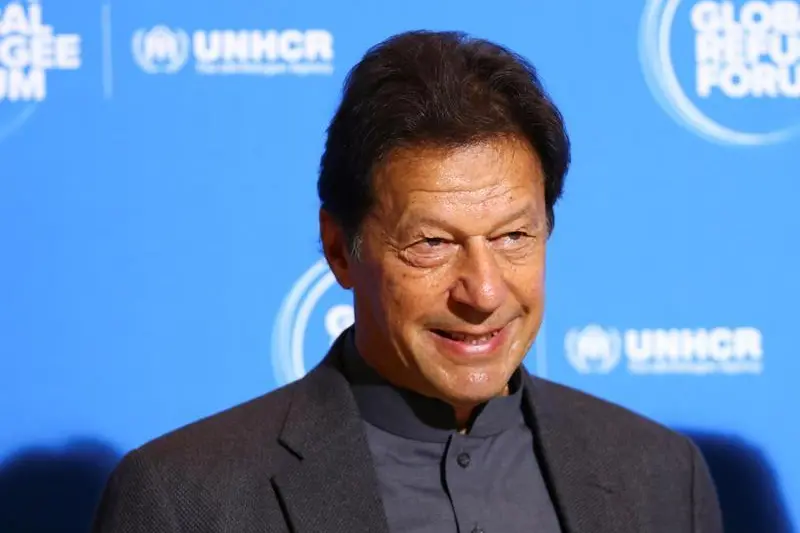PHOTO
With an eye to boosting their mutual cooperation, Pakistan’s Prime Minister Imran Khan arrived in Saudi Arabia on Friday at the invitation of Crown Prince Mohammed bin Salman to begin a three-day official visit, with energy, economy and the welfare of overseas Pakistanis expected to top the diplomatic agenda.
“We believe this is a very important visit of Prime Minister Imran Khan to Saudi Arabia with respect to our historic bilateral relationship, trade and economic ties,” Zahid Hafeez Chaudhri, a spokesman for the Pakistani foreign office, told Arab News.
“The two sides will discuss economy, trade, investment and job opportunities for the Pakistani workforce in Saudi Arabia, besides signing a number of agreements on energy and infrastructure related projects.”
Indeed, the Kingdom is an extremely important trade destination for Pakistan and both countries have been searching for ways to boost their partnership along with the volume of imports and exports.
At present, the trade volume between both countries stands at $3.6 billion, with imports from Saudi Arabia worth $3.2 billion and exports to the Kingdom worth $316.3 million, according to the Federation of Pakistan Chambers of Commerce and Industry.
“Our exports to Saudi Arabia have increased this year after our companies were allowed to export halal meat and livestock, and we are trying to further boost it,” Shahid Ahmed Leghari, chairman of the Pak-Saudi Business Council, told Arab News.
Pakistani companies had also started exporting spices and garments to the Kingdom, he said, but there is room for improvement. “We can boost our bilateral trade to $20 billion per annum if we are allowed to export rice, fruits, vegetables, wheat flour and dairy products to the Kingdom,” Leghari said.
Khan’s visit to Saudi Arabia will help “open new business opportunities” for Pakistani businessmen and exporters, he added.
Ahead of the visit, Pakistan’s Cabinet on Tuesday approved the establishment of the Supreme Coordination Council between the country and Saudi Arabia to “remove hurdles” to investment deals signed during the crown prince’s visit to Pakistan in February 2019.
During the crown prince’s 2019 visit, officials of both countries signed key memorandums of understanding worth $20 billion in the fields of energy, petrochemicals, minerals, agriculture and food processing.
Khan will be accompanied on his Saudi visit by a high-level delegation, including the foreign minister and other members of the Cabinet.
He will also meet Dr. Yousef Al-Othaimeen, secretary general of the Organization of Islamic Cooperation; Mohammad bin Abdul Karim Al-Issa, secretary general of the World Muslim League; and the imams of the Two Holy Mosques in Makkah and Madinah.
Khan will also meet with members of Pakistan’s diaspora community in Jeddah during his stay in the port city. The Kingdom remains the largest source of overseas remittances to Pakistan, with Pakistani workers sending home $6.6 billion in the last fiscal year and $5.7 billion from July to March this fiscal year, according to the State Bank of Pakistan.
These remittances are an important source of foreign capital for Pakistan as it fights to stabilize its economy, crippled by the coronavirus pandemic.
“This visit is important because Pakistan is facing real financial challenges where we have to maintain our foreign exchange reserves,” Qamar Cheema, a Pakistani foreign-relations analyst, told Arab News.
“Pakistan is also facing challenges since the UAE visa (for Pakistanis) has not been resumed and at the same time the Pakistani diaspora is very much important. So, Pakistan wants its strategic partnership with Saudi Arabia to remain the same.”
Just weeks after Khan assumed office in August 2018, Saudi Arabia helped Pakistan stave off its looming balance of payments crisis by extending a $3 billion interest-free loan and another $3 billion deferred payment facility for the import of oil.
In exchange, “Pakistan wants to share its experiences with Saudi Arabia, making Saudi Arabia green. And Pakistan also wants to share its (military) experience to protect the security of Saudi Arabia,” said Cheema.
“We are going to nudge forward from where we left off back in 2019 when the crown prince came here.”
The Kingdom has often stood by Pakistan during difficult times, extending financial support during wars and natural disasters.
“Pakistan cannot forget the extensive Saudi financial support in the form of oil supply and cash during our difficult times, such as the earthquake in 2005 and flash floods in 2010 and 2011,” Javed Hafeez, a former ambassador to Saudi Arabia, told Arab News.
The presence of Pakistan’s army chief Gen. Qamar Javed Bajwa in the Kingdom ahead of the prime minister’s visit indicates both countries are interested in “enhancing defense cooperation” and economic ties, he said.
“Saudi Arabia is a time-tested and trusted friend of Pakistan, and the prime minister’s visit will definitely help open new vistas of economic cooperation,” Hafeez said.
Copyright: Arab News © 2021 All rights reserved. Provided by SyndiGate Media Inc. (Syndigate.info).





















